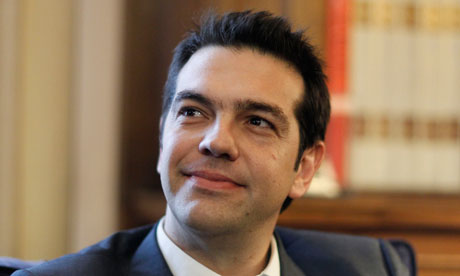Phillip Inman, economics correspondent guardian.co.uk,
Tuesday 8 May 2012 21.04 BST
Will the country stay in the euro, negotiate an exit, or be chased out of the monetary union?
Alexis Tsipras, leader of the Greek radical left coalition Syriza, who is trying to form a coalition. Photograph: Kostas Tsironis/AP
Greece stays in the euro
Likelihood: 2/5
After an election that pushed Greece's pro-euro parties into a minority, the prospects for this scenario look slim. The country's mainstream parties – the right-of-centre New Democracy party and the social democrat party Pasok – saw their vote collapse to 32%, which translates as 149 out of 300 parliamentary seats. Compare this result with Pasok's landslide victory in the last election in 2009, when it gained 44% on its own.
But that's not the end of the story. After looking into the abyss, the majority of Greeks who tell pollsters they want to stay in the euro could bring themselves to support pro-euro parties in a second election. After all, they didn't vote for far-left or far-right parties just on the euro issue. Pasok's leader, Evangelos Venizelos, was punished in part for favouring cuts hitting the poor and public sector wages and ignoring the wealth and incomes of the richest that go untaxed to the tune of €77bn (£62bn).
The New Democracy leader, Antonis Samaras, was punished for underestimating the huge anger of the population over economic hardship, mismanagement and corruption when he insisted on calling Sunday's vote instead of allowing the interim prime minister, Lucas Papademos, to continue.
A second election would give the pro-euro majority a chance to rein in their anger and vote for one of the two main parties. Greece could then bid for more concessions from Brussels.
Greece negotiates an exit
Likelihood: 4/5
The meteoric rise of the radical left coalition Syriza and its charismatic leader, Alexis Tsipras, 37, is the biggest surprise of Sunday's vote. Tsipras, whose party came second with almost 17% of the vote to New Democracy's 18.8%, received a three-day mandate from President Karolos Papoulias on Tuesday and is expected to use every hour to meet a wide range of social groups as well as the other parties.
Tsipras says he wants to stay in the euro, but with a radically different bailout deal and an easing of public spending cuts and structural reforms.
He has been rejected by the communists, who want out of the euro full stop. There is a hint he will sign up with Pasok, but he has already told the two main parties they must renounce all their previous negotiations in Brussels before he will sit down with them.
Pride is a huge factor in such negotiations and it seems unlikely Pasok will succumb, despite its dismal 13.2% showing. Tsipras simply does not have the numbers, with only 52 seats and the Democratic left's 19, to form his own leftwing alliance.
An impasse could lead to a negotiated exit after Brussels and Berlin agree Greek politics is so fragmented and polarised that no conclusion is likely. If Pasok and Syriza agree there is no way forward, it could force a vote and, with the support of communists and the neo-Nazi Golden Dawn party, send representatives to conclude Athens's departure from the euro.
Greece is chased out
Likelihood: 3/5
The inconclusive election on Sunday could be followed by another in a few months. Riots and fractious parliamentary disputes could delay spending cuts and reforms demanded by Brussels and Berlin. Without much more procrastination, a breakdown might lead Brussels to conclude that Greece has such deep-seated internal problems that bailout funds must be switched off.
Without the means to pay public sector workers and fulfil contracts, the parliament pulls out of the euro. It is Argentina and Iceland all over again. Foreign creditors are told loans will not be repaid.
Border controls block all money leaving the country. Drachmas worth around 10% of the euro are distributed by local banks, which are nationalised to stop them going bust.
Unlike Argentina and Iceland, the devaluation has knock-on effects for other countries, in particular Portugal, Ireland, Italy and Spain. On the basis that investors may not get their money back from these countries, they begin pulling their funds out, leaving Brussels with an even bigger bailout bill than for Greece – even a Greece entirely dependent on eurozone countries for loans and handouts.
![The [Greek] European Tragedy](https://blogger.googleusercontent.com/img/b/R29vZ2xl/AVvXsEiWKI5s90SFm1wWTk6bs4p7CgslaC2SnYPsrZhb-B-smOufNNCSxCvpBLI9hOB-LsXZjir_PNmEiMk2-E62F3xkg96IoC6QFAaZAnPRTVH340IN9WBRmWJqPkjWlgyRj3zpALp7h6hvA58/s920/GkBack_new.jpg)

